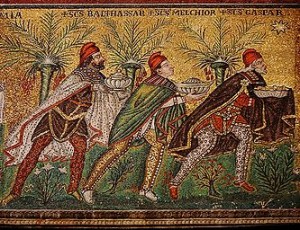 This is an encore presentation of a December 2011 podcast episode examining the Christmas story as it traditionally gets told—looking closely at what the scriptures actually say and do not say about the birth of Christ and all the pieces of this familiar story? How do the Matthew and Luke accounts differ—even irreconcilably? What motives are behind the Gospel writers’ decisions to shape the stories the way they do? What about the Jesus’s place of birth and the reason the family was in Bethlehem (if they were)? Was there a great tax and registration? What about “no room at the inn,” the manger, the star, the magi, the story of Herod killing all male infants under two years old? How did Christmas come to be held on December 25th?
This is an encore presentation of a December 2011 podcast episode examining the Christmas story as it traditionally gets told—looking closely at what the scriptures actually say and do not say about the birth of Christ and all the pieces of this familiar story? How do the Matthew and Luke accounts differ—even irreconcilably? What motives are behind the Gospel writers’ decisions to shape the stories the way they do? What about the Jesus’s place of birth and the reason the family was in Bethlehem (if they were)? Was there a great tax and registration? What about “no room at the inn,” the manger, the star, the magi, the story of Herod killing all male infants under two years old? How did Christmas come to be held on December 25th?
In this episode, Mormon Matters host Dan Wotherspoon and panelists Kristine Haglund, Jared Anderson, and Zina Petersen explore all these questions plus lead a fascinating tour into other parts of the Christmas story. Why are only five women mentioned in the Gospels’ presentations of Jesus’s lineage—and why are the ones listed all women with “questionable” sexual pasts? What are the Twelve Days of Christmas? What is the “Immaculate Conception” and how does it affect theology about Mary and ideas about the Eucharist and other religious devotions? How has pagan history and ideas folded into the history of “Christmas” (not Jesus’s birth but the celebration of it)? The panel discusses solstices and equinoxes, meshings of calendaring systems, the link between carnivals and holy days, shepherds’ presents to the Christ child, and even a longstanding tradition of “ghost story” tie-ins with Christmas that Charles Dickens resurrected. Why was there a period of time in which Christmas was illegal? And much more!
Perhaps most important, however, is the discussion of how and why the panelists and many other Christians throughout history, knowing all that they know about what likely is and is not factual about traditional accounts, still celebrate Christmas, joyfully sing carols alongside those for whom the stories are less complicated, and experience this season as spiritually enriching.
This is an episode not to be missed! Please join in the conversation below!
_____
Some links of possible interest:
Sunstone magazine article by Stephen E. Thompson, “Away in a Manger,” exploring the differences between Matthew’s and Luke’s accounts, and giving a possible constructive framing of how to view these stories as still worth celebrating. (Mentioned by Dan a few times during the podcast.)
Kevin Barney blogpost at By Common Consent that outlines major considerations in the “when was Christ born?” line of inquiry. (Also mentioned by Dan during the podcast.)


Comments 7
Great podcast. It’s worth listening to again this Christmas.
I think that you guys should do something similar around Easter and discuss the narratives of the Resurrection and the history of the Easter tradition.
I’ve just finished reading through N. T. Wright’s “The Resurrection of the Son of God” and found it a fascinating read — a friend in Utah mentioned it. A long, long, long read but very worth persevering with on the Easter stories and historicity.
Thanks all of you above. Just lined things up for a dive into Easter, resurrection narratives, development of traditions! Watch for it near beginning of Lent.
+1 to Adam’s suggestion, an Easter tradition discussion would be a great topic.
I enjoyed this podcast last year, though it was after the Christmas season so I am happy that it is being re-posted again for this Christmas season for a re-listen.
Pingback: A Christmas Primer - LDS Social Network Forums
Another thing I find fascinating is that in Luke, it mentions the taxation or census when Cyrenius was governor of Syria. Interestingly, Herrod the Great died in 4 B.C.E., and Cyrenius wasn’t governor until 6 C.E.
As a result, the birth story in Matthew and the one in Luke chronologically contradict each other. It’s kind of amazing to learn some of these things. Keep up the good work.
If you wish a higher criticism, liberal treatise on the birth of Jesus of Nazareth, I would recommend this podcast. If you wish a highest criticism treatise where the ancient records of the birth account are treated as any other ancient document, please look elsewhere.